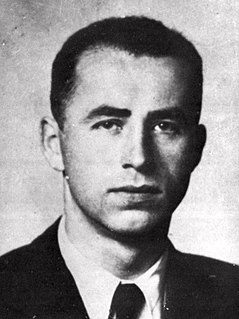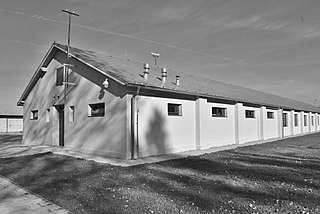
Alois Brunner was an Austrian Schutzstaffel (SS) officer who worked as Adolf Eichmann's assistant. Brunner is held responsible for sending over 100,000 European Jews to ghettos and concentration camps in eastern Europe. He was commander of the Drancy internment camp outside Paris from June 1943 to August 1944, from which nearly 24,000 people were deported.

Obergruppenführer was one of the Third Reich's paramilitary ranks, first created in 1932 as a rank of the Sturmabteilung (SA), and adopted by the Schutzstaffel (SS) one year later. Until April 1942, it was the highest commissioned SS rank, inferior only to the Reichsführer-SS. Translated as "senior group leader", the rank of Obergruppenführer was senior to Gruppenführer. A similarly named rank of Untergruppenführer existed in the SA from 1929 to 1930 and as a title until 1933. In April 1942, the new rank of SS-Oberst-Gruppenführer was created which was above Obergruppenführer and below Reichsführer-SS.

SS-Oberst-Gruppenführer was the highest commissioned rank in the Schutzstaffel (SS), with the exception of Reichsführer-SS, held by SS commander Heinrich Himmler. The rank is translated as "Supreme group leader" and alternatively translated as "colonel group leader". The rank was correctly spelled Oberst-Gruppenführer to avoid confusion with the more junior rank of Obergruppenführer.

Generaloberst, in English colonel general, was, in Germany and Austria-Hungary—the German Reichswehr and Wehrmacht, the Austro-Hungarian Common Army, and the East German National People's Army, as well as the respective police services—the second highest general officer rank, ranking as equal to a 4 star full general but below general field marshal. It was equivalent to Generaladmiral in the Kriegsmarine until 1945, or to Flottenadmiral in the Volksmarine until 1990. The rank was the highest ordinary military rank and the highest military rank awarded in peacetime; the higher rank of general field marshal was only awarded in wartime by the head of state. In general, a Generaloberst had the same privileges as a general field marshal.
The title of SS and police leader was used to designate a senior Nazi official who commanded large units of the SS, Gestapo and the German uniformed police (Ordnungspolizei), prior to and during World War II.
Gruber is a German surname from Bavaria, referring to a person from a geological depression, mine, or pit. It is the most common surname in Austria.
Leitner is a German surname. Notable people with the surname include:

The Operational Zone of the Alpine Foothills was a Nazi German district in the sub-Alpine area created in Italian territory during World War II.
Allan H. Meltzer was an American economist and Allan H. Meltzer Professor of Political Economy at Carnegie Mellon University's Tepper School of Business and Institute for Politics and Strategy in Pittsburgh, Pennsylvania. Meltzer specialized on studying monetary policy and the US Federal Reserve System, and authored several academic papers and books on the development and applications of monetary policy, and about the history of central banking in the US. Together with Karl Brunner, he created the Shadow Open Market Committee: a monetarist council that deeply criticized the Federal Open Market Committee.
Karl Brunner was a Swiss economist.
Karl Brunner was an Italian luger who competed from the early 1970s to the mid-1980s. He won the silver medal in the men's doubles event at the 1980 Winter Olympics in Lake Placid, New York.
Helmut Brunner was an Italian luger who competed in the early 1980s. He won the gold medal in the men's doubles event at the 1984 FIL European Luge Championships in Olang, Italy.
Walter Brunner was an Italian luger who competed in the early 1980s. He won the gold medal in the men's doubles event at the 1984 FIL European Luge Championships in Olang, Italy.
Events in the year 1899 in Germany.
Thaler is a surname of Austrian origin. It may refer to:
Brunner is a German surname. It originated from the Middle High German word Brunne meaning spring or water well. It can also refer to people from places named Brunn. Notable people with the surname include:

Sereď concentration camp was a concentration camp built during World War II in the Slovak Republic. It was founded as a labor camp for the Jewish population in September 1941. In September 1944, it was transformed into a concentration camp and was operated by units of the SS.
Carltheo Zeitschel also Carl Theo,, was a German physician, diplomat, Nazi functionary and SS-major (1940).
Karl Brunner was a German lawyer, SS-Brigadeführer and Generalmajor of the police and the SS and police leader in Salzburg and Bolzano. Brunner served as head of the Einsatzkommando 4/I during the invasion of Poland and the early stages of the German occupation in 1939, tasked with the killing of Polish civilians. During his time in Northern Italy he was also responsible for the arrest, and ultimately, the deportation of the Jews in his area of jurisdiction, as well as reprisals against Italian civilians.
This page is based on this
Wikipedia article Text is available under the
CC BY-SA 4.0 license; additional terms may apply.
Images, videos and audio are available under their respective licenses.





